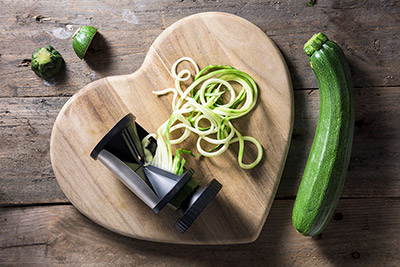Foods Fit for Summer (Part 3): Zucchini
August 24, 2017
In recent editions, we’ve been featuring healthy foods you can find in season this summer. This week we’re looking at one of the most prolific and versatile garden vegetables, zucchini.
Zucchini can be used both raw and cooked in a range of flavorful dishes that are good for your health, and help support fitness and weight loss. Read on to learn more and try our tasty recipe, too!
Summer Squash Superstar
In winter, the squash varieties that are in season, like pumpkins and acorn squash, have more sugar and starch in general than summer squash like zucchini, which has a higher water content. Zucchini, which is low in natural sugars and starches, also has no fat and is a good source of fiber.
We know that low-sugar and low-carb diets can be effective in bodyweight management since they positively impact insulin and other hormones. And with obesity as a key heart disease risk factor, zucchini can play a role in a heart-healthy diet that supports weight loss. Zucchini is also a good source of B vitamins and vitamin K, which can affect protein synthesis, metabolism, bones, blood, kidneys and more.
But the summer squash nutrition doesn’t stop there. Here’s more:
- Vitamin C: When you think of vitamin C, you might think of citrus fruit, but one medium zucchini provides about half of your daily vitamin C needs. Foods high in vitamin C can help lower blood pressure and protect against inflammation, heart disease, cancer, aging and more.
- Potassium: One cup of cooked zucchini gives you more than 15 percent of your daily recommended potassium – and that may be even more than what you’ll find in many multivitamin supplements. Along with sodium and calcium, potassium serves as an electrolyte for transmitting the nerve communication involved in muscle contraction. A potassium-rich diet can work to ward off high blood pressure, too.
- Polysaccharides: Zucchini is comprised of a lot of water and some carbohydrates as well, specifically the type called polysaccharides. In particular, zucchini features a high percentage of pectin, a water-soluble fiber and type of polysaccharide linked to improved cardiovascular health and the ability to lower cholesterol.
- Fiber: Zucchini’s pectin fiber, like the pectin found in apples, reduces disease-causing inflammation, supports artery health and benefits your digestive system. It could also offer protection against diabetes and insulin resistance. And, because dietary fiber helps fill you up, it can work to offset overeating.
Because zucchini has a mild flavor and is so easily sourced, it can be found in many cuisines, like French (called “courgette” in many cultures, zucchini is a feature in ratatouille), Italian (when you’re skipping pasta you can turn to “zoodles”), Asian, Indian and more. The recipe below brings amazing summer flavor to a dish that is traditionally Middle Eastern.
This low-cal grilled zucchini dip is a variation on baba ganoush, which is made with smoky eggplant. It’s vegan, gluten-free and legume-free, and will make a terrific addition to your clean eating appetizer selection and your healthy weekday lunchbox needs.
Zucchini Hummus
Makes 2 cups
INGREDIENTS- 1 - 1 ½ lbs. zucchini (about 2 medium)
- 2 - 3 cloves garlic pressed (to taste)
- ¼ - ⅛ cup lemon juice
- ¼ cup tahini
- Sea salt and ground pepper to taste
- ¼ teaspoon cayenne pepper (optional)
- ¼ cup minced fresh flat leaf parsley (optional)
- 1 Tbs. olive oil
DIRECTIONS
Cut zucchini into ½ inch thick strips lengthwise, brush with olive oil and then grill on medium heat until marked and tender (if skin is very tough, peel it, otherwise it’s not needed). Wrap in foil and let steam as you place the rest of the ingredients in a food processor or blender. Add the grilled zucchini to the processor and puree until rather smooth and thick. Drizzle with olive oil before serving, warm or chilled, with vegetables and/or whole wheat pita bread.